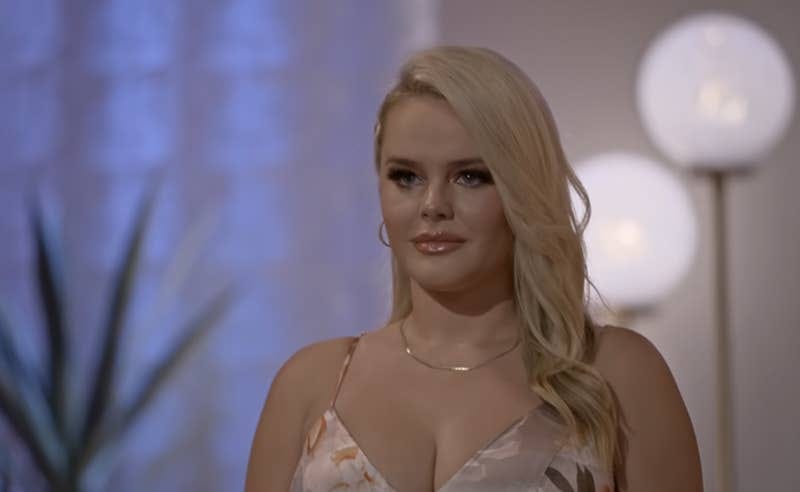SOMETIMES WOMEN WEAR MAKEUP
Back again with some reminders for the 'Love is Blind' cast and crew
I’m back from a week of events on the East Coast for Touched Out, and while I am exhausted, I’m also excited to get back to writing to you all here!
While I was away, needing to disappear myself into a screen between events, I caught up on this season of Love is Blind, and I’m sorry to report that I have nothing but bad news about this terrible show. It’s not going so well. Only a few couples actually made it past the “pods,” and already, most relationships are imploding.
But what more can we expect? During the last season of Love is Blind, I wrote about the unquestioned presumption of maternity that led, in the finale, to a variety of moralistic judgements about the women. We’re seeing a lot of that this season, too.
As I wrote of last season’s debate about whether one contestant had “natural” maternal qualities:
…it’s hard to believe that these sorts of conversations are still happening in huge public forums— that maternal readiness is still being used as a litmus test for a good wife, or a good woman, or a good person…
And yet, here we are again with this weird show, this time debating the question of “natural” beauty.

I started watching LIB reluctantly because I suppose its gimmicky structure has made it the new reality TV dating show on the block. But this season has, disappointingly, already continued the series tradition of giving men ample airtime to make moralistic judgements about the women they are dating— first for the way they have conducted themselves in past relationships, and now for… wearing makeup?
In the most recently released episodes, which dropped this past Friday, one of the couples—JP and Taylor— got into after JP revealed that he was put off by the amount of makeup Taylor wore during their first meeting—what he calls a “caked-up face” and fake eyelashes. For way too many minutes, JP explains that his inability to communicate with Taylor for days was actually her fault, a result of her appearing “fake” at their first meeting. She defends her appearance and her feminine desire to “look pretty.”
The conversation is unsettling, first and foremost, for the way JP gradually attacks Taylor. He feels entitled, for some reason, to share how, on that first day, the one time she wore makeup in front of him (!), he spun out internally, wondering whether this meant Taylor would be high maintenance. He also shares that he felt she didn’t look like “a real person.”
The conversation highlights the impossible standards set for women around beauty, and how, in their efforts to meet those standards, women often face dehumanization and further disciplinary tactics by men like JP, who then try to exert control over how women should go about responding to those ideals.
Toward the end of the conversation, JP also barks at Taylor that she should “be happy” that he “likes her better without makeup,” which he believes “99% of women would love to hear.” It’s a very gaslighty moment, but JP’s distress about Taylor’s false eyelashes and the foundation he alleges rubbed off on his jacket also underlines a fundamental misogynist belief about women’s beauty: that a woman’s body should appear flawless but also real.
I happened to watch these episodes just a day after I had my own makeup professionally done for a book event. At the event, I shared with a friend that I feel self-conscious whenever I have my makeup done because it feels like so much—but the truth is that what makes me feel uncomfortable about having lots of makeup on is 1) it betrays a presumably excess effort that I want to pretend I don’t take in my appearance, and 2) heavy makeup is not super “in,” I find, in literary and academic circles.
Humming underneath all this, however, are a lot of classist and racist assumptions that lead to, as
points, a cultural tendency to see women who wear more makeup as less-than, and a demand for women to hide what Susie Orbach calls “the work of body making.”Later this week, I’ll be sharing my conversation with the brilliant writer Allie Rowbottom, author of the memoir Jell-O Girls and, most recently, the novel Aesthetica (just out in paperback!). As Allie shared with me in that conversation, the “prosthetic/natural binary” is, like all binaries, a false one, which relies on an equally false association between the natural and the pure. Allie shares so many insights on this binary in our conversation (like what’s going on with “natural” beauty on dating apps!), so I won’t spoil. But the takeaway here is that, per usual, we can trace the shaming of women who seem to invest too much in beauty standards back to the disciplining of feminine bodies into a kind of goodness—a goodness we are expected to pursue at all costs, despite how unattainable the standards may be.
We also must never reveal that we are in pursuit of meeting these standards, lest our goodness reveal itself as anything less than natural.
Maybe she’s born with it, right?




